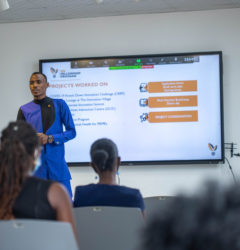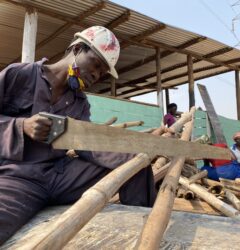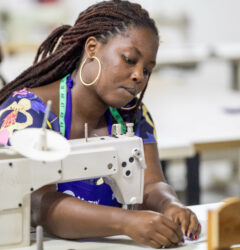31 May

Even though Steven Bitum is clad in a green Tukole Uniform in a corner of The Innovation Village all day, his occupations switch through the day. A cleaner by day and an enrolled University student in between the cleaning breaks, Bitum is chasing many dreams at once.
When he is not holding a bucket and a mop, a student notebook filled with classwork lies open as he attends to his education. He says these are notes from a history class that he began a month ago in pursuit of a Bachelor’s degree in Education. The notes are helping him do his class assignments that he must hand in to beat a deadline.
“I wanted to become two things; A teacher and a programmer. I used to do Information Technology very well in school. It is just that when I applied to university, I was given a course in Education. However, I plan on getting my own laptop some day and begin training in programming,” he says.
In the morning, he works at his job doing hygiene maintenance with his colleagues and when there is a work break, he catches up on his course work for the university.
Getting onto the Tukole Platform
At the age of 24 and unable to continue with school after Senior six, Bitum took to working in a cleaning company in 2019. While there, he heard about how Tukole was skilling and onboarding blue-collar workers. He seized the opportunity and applied.
Tukole, loosely translated as “let’s work”, is an online platform for networking between employers and employees in the blue-collar industry. It is Uganda’s connected marketplace that gives access to verified, reliable domestic and commercial professionals for manual labour. Services provided include plumbing, electrical, carpentry, and hair and beauty.
The platform bridges the gap between individuals and companies sourcing for artisans, vocational, technically skilled and talented young people searching for job opportunities in the labor market. The ultimate goal of connecting workers and customers on the platform is to create trust and market for blue-collar services online. Subsequently, this is increasing employment opportunities for skilled youths in Uganda.
Through skilling sessions, the young professionals are empowered on how to value their competencies and how to make monetary negotiations for different tasks at a fair price commensurate with the work.
“I was already familiar with cleaning but Tukole has made me a professional. I have learnt how to handle an executive office,” Bitum says.

He says that through Tukole, he learnt how to use various machines including scrubbing machines and vacuum cleaners. He now understands time management, customer service and flexibility from a new perspective and this has helped him navigate his roles with ease and produce customer satisfaction.
In his view, Tukole is a promising platform. Bitum says that there is a huge difference between working for Tukole and another company but the biggest benefit for him has been enabling him to chase his dreams again.
He says, “I testify about Tukole for one thing. It has given me the motivation to go back and study. The company I used to work in used to discourage us from studying because they wanted to keep us busy. Under Tukole, I gave them my idea and they supported my decision to return to school.”

He credits the environment at The Innovation Village for inspiring him to return to school. “The place restores hope in me,” Bitum gestures to writings and images on the wall, “You look all around you and you see messages such as ideas to life.”
The salary from Tukole is able to support at least half the costs of his education. He likes the fact that Tukole’s mode of payment is through the bank which means that he can access his salary on time and from anywhere.
The cooperation among the startups in the co-work space and the advice that comes from the entrepreneurs through interactions with him, form part of the inspiration for working on his ideas too.
Tukole Lead Phyllis Nassuna has made it her business to urge the team to look out for growth opportunities that will elevate them from their current roles. She encourages the workers to get skilled into leadership roles or even taking up professional jobs once they have acquired other skills.
Nassuna says there is more than meets the eye for Tukole workers. “When we started the cleaning service contract, we took on the cleaners of the previous service provider. We hoped that taking on the contract would not put over 15 people out of work to hire others. We also hoped to offer them something that was more than just a paycheck at the end of the month,” she says.










Recent Comments